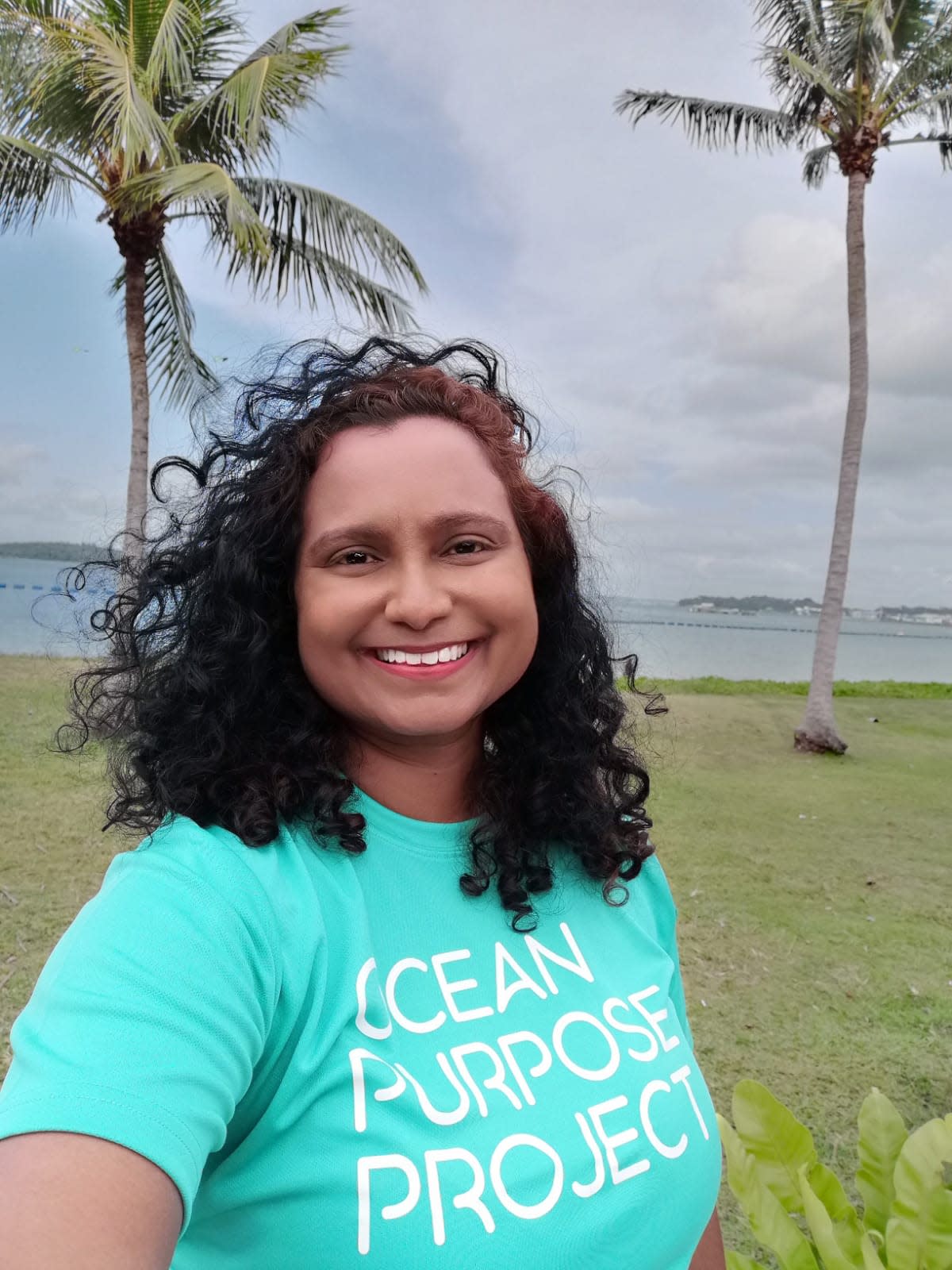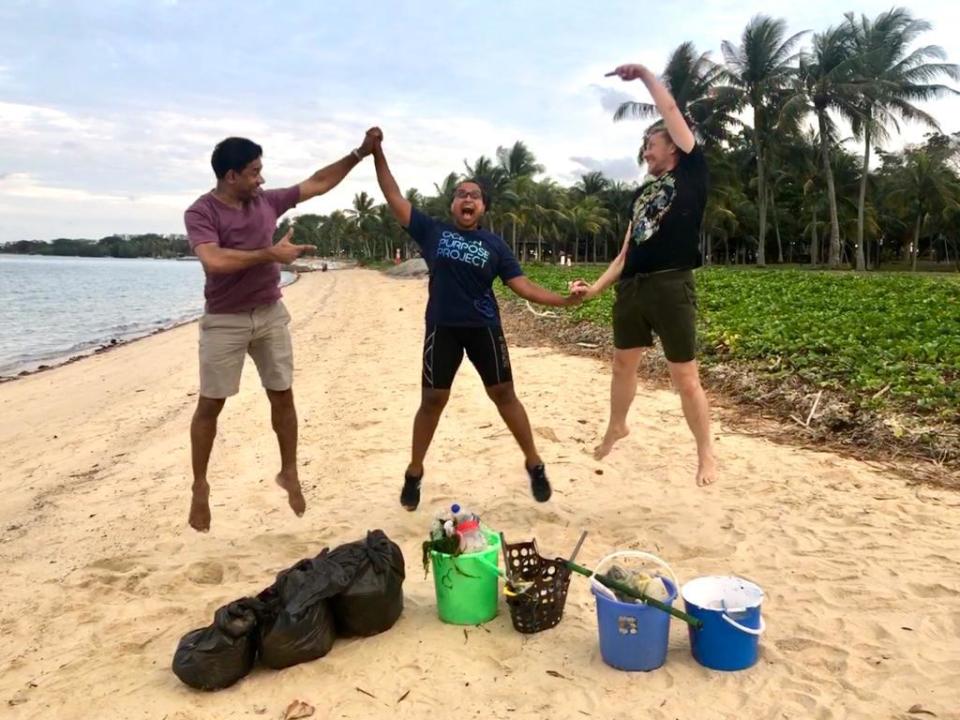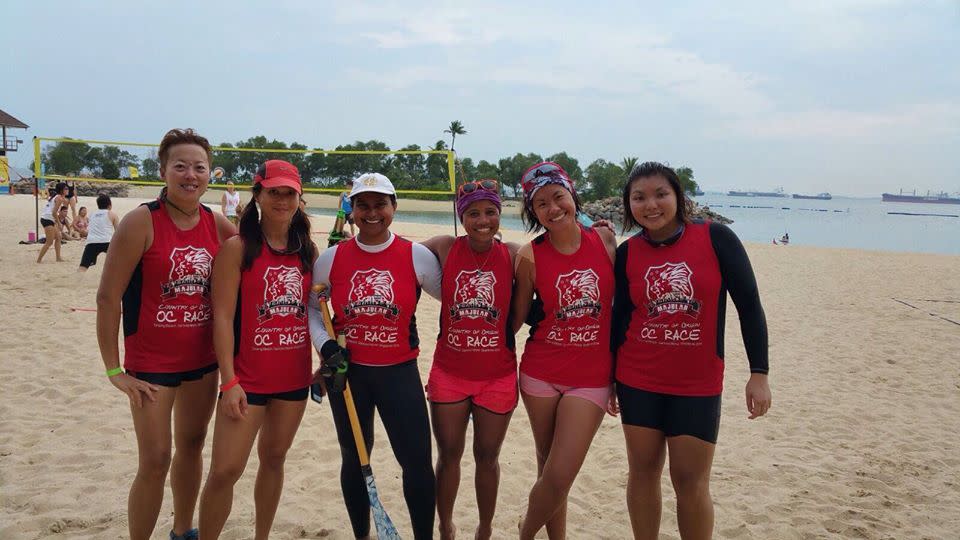Ridding the oceans of plastic: Mathilda D'Silva's dream of sustainability

Welcome to the Local Heroes series, where we highlight inspiring stories by people in Singapore who are using their skills to do good.
SINGAPORE — Mathilda D’Silva has a big dream for her hometown of Pasir Ris.
The founder of Ocean Purpose Project hopes that the coastal district of Pasir Ris will be the model for a sustainable economy and community centred around the production and use of eco-friendly bioplastics produced from the sea.
These biodegradable plastics would be made purely from seashells and seaweed. In Mathilda’s vision, kelongs along the coast would grow seaweed, and farms would grow mussels, as the raw materials for the production of these plastic substitutes.
Businesses in the area would then use the bioplastics as eco-friendly alternatives to single-use plastics used commonly in plastic bags and disposable packaging.
“All the way from Punggol up to Loyang, we would have communities, schools, tai chi groups, water sportspeople doing beach clean-ups, talking about the beauty of the beach, talking about the wildlife that lives there,” said Mathilda.
Eventually, Mathilda hopes that this vision of sustainable communities spreads to every corner of Singapore.
But Mathilda’s dreams are not limited to the confines of Pasir Ris or even Singapore. Her ambition for sustainability extends beyond these shores to include the region and also the globe.

Plastic waste, as well as its impact on our coasts and waters, is a big problem in Singapore and around the world. Last year, a beach clean-up organised by the World Wide Fund for Nature (WWF) in Singapore collected two tonnes of plastic waste in just one day.
In Singapore, about 700 million kg of plastic waste is discarded every year, but less than 10 per cent of plastics are recycled. Plastics in the oceans and coasts release toxins into the environment and harm marine life. WWF estimates that by 2050, there could be more plastics in the ocean than fish by weight.
Mathilda left her job as a social media strategist at DBS bank in November 2019 to focus on her social enterprise, Ocean Purpose Project.
Although she is now a professional environmentalist, the 38-year-old wears many hats and has seemingly boundless energy. In her career and personal life, she has been a singer, actress, TV producer, radio DJ, social media manager, athlete and now, she’s a full-time social entrepreneur.
“There are always 110 things happening at any one time in my life. You can accuse me of a lot of things, but you can never accuse me of being lazy or, like, just wanting to nua (slack) all the time,” said Mathilda.
Ocean Purpose Project’s goal is to bring about disruptive change in the way we manage the problems of marine pollution.
“I just felt that doing one little beach clean-up here, and another little beach clean-up there didn't make sense,” said Mathilda. “So I wanted to step it up and create a social enterprise to find small, very dynamic, innovative, disruptive ocean purpose projects. The aim is at creating massive scale impact and deploying them, testing them, failing sometimes, but then building on successes to drive change. If we can come up with all of these small little projects that have that mass scale impact, and get a lot more people to do these projects, we're just going to drive change at a bigger rate.”

Last year, Ocean already tasted real success at reducing the plastic waste problem in Medang, an island in Indonesia off the coast of Sumbawa. The company raised S$10,000 for a pyrolysis machine for the community, which can convert plastic waste collected from beaches into fuel for residents.
Ocean is currently partnering the National University of Singapore and St. John’s Island National Marine Laboratory to research sustainability technologies.
Mathilda is also engaging with government leaders to promote her sustainable vision for Pasir Ris, which she hopes can be replicated across Singapore eventually.
Mathilda runs Ocean with only two other full-time employees and some volunteers. Money comes purely from her savings at the moment, a testament to her passion for its goals. Ocean is, however, looking at obtaining funding from start-up incubators and investors.
Mathilda calls her own idea “audacious” and “crazy”, but believes in the power of already existing technology to dramatically improve sustainability. “Last year when I was presenting this in November, at the Temasek Startup X Hackathon, there were people from banks, the PMO’s office and all of that, looking at me going like, if plastic can be turned into fuel, and it's so easy, why haven't we done it already?”
“And my point was, exactly, why haven't we done it already? I mean, I'm not the first person to think about this. If you Google plastic-to-fuel facilities, you're gonna find a lot of companies around the world that are doing this. So the question is, why haven't we integrated and come up with a solution where we could solve the ocean plastic crisis through industry today if we wanted to.”
Besides building environmental sustainability projects, Mathilda believes building awareness of the issues and problems that face us are equally important. Before the pandemic restricted physical gatherings, Ocean organised educational events and activities for companies and the community. Currently, Ocean has been focusing more on virtual live-streamed events to promote awareness of marine sustainability.
Striking out on her own to run a social enterprise has been “painful”, though. “My mum asks me, why can’t I sell handbags? If I just wanted to start a business, that would have been so much easier,” Mathilda jokes.

Mathilda’s belief in the importance of keeping our coasts and oceans clean stems from very personal trauma. Since 2015, she has had to tackle many health problems which she suspects are related to severe marine pollution she encountered during a trip to Boracay.
An avid water sports lover, Mathilda enjoys dragon boating, outrigger canoeing and stand-up paddleboarding. In 2015, she participated in the Boracay International Dragon Boat Festival in the Philippines.
The island of Boracay used to be one of the Philippines’ most famous beach holiday destinations. But in 2018, the Philippine government ordered the closing of Boracay to tourists to do a massive clean-up of raw sewage dumped into the sea for years and had led to an enormous build-up of pollutants in the waters.
Mathilda says that after the three-day dragon boat competition, she returned to Singapore and was hospitalised for three days.
“I was like, oh, maybe it's exhaustion... My stomach was terrible. My immune system just failed on me. And I found out that at least about 20 to 30 other dragon boaters from all over the world had experienced the same thing,” said Mathilda. She also experienced unexplained muscle spasms.
Now, five years after that dragon boat competition, Mathilda continues to suffer from autoimmune disorder and vitiligo, which causes discolouration of her skin and hair.
When Mathilda heard the news of Boracay’s pollution problem in 2018, she surmised that the unclean waters probably contributed to her health problems. “Only then did everything click, and it all started to make sense. You know, just that one weekend of exposure to all of that polluted ocean water – we were swimming in it, paddling in it and all of that – had just caused my body to crash.”
Despite her health problems, she still loves the water and gets in the water every day. “I can live without a lot of things. But being in the water, and being in the sun… man, you can’t just ask me to give that up.”
READ MORE:



